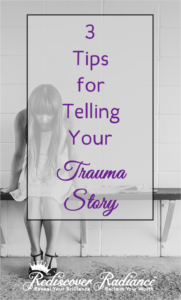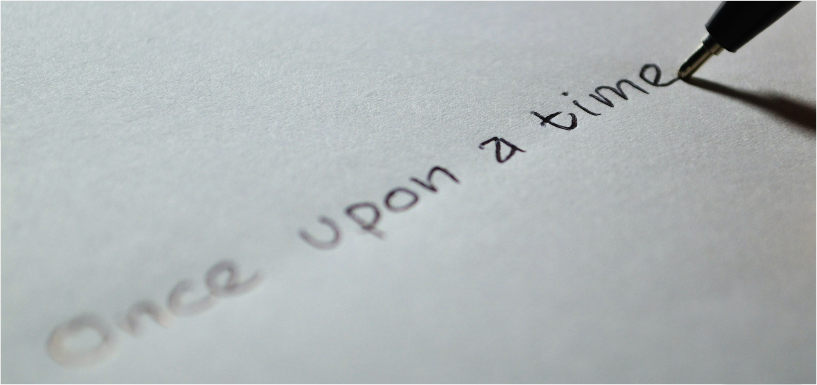In my last post, I shared one of my top tips for telling your trauma story. When you’re finally ready to break the silence, you may be tempted to scream it from the rooftops and tell the world. You’d probably feel a big sense of relief to finally get that secret out in the open. But it could also cause bigger headaches than you’re prepared for. Before you contact the Hallmark channel to make your life story into a movie of the week, do yourself a huge favor and read tip #1. You’ll thank me for it, I promise 🙂
And now, I bring you Tips #2 and #3 for Telling Your Trauma Story.

Tip #2 – Don’t compare your trauma story to anyone else’s.
In light of recent high-profile sexual assault allegations, no doubt you’ve heard about the #metoo movement. Perhaps you’ve even participated in it yourself. For several weeks, my Facebook newsfeed was inundated with woman bravely telling their stories. Some women went into great detail about their experiences. Others simply commented, “#meetoo.”
On the whole, I saw a tremendous amount of solidarity and support among the people who commented on these women’s stories. However, in the midst of these heartbreaking tales, I also saw something concerning. Many women commented things like, “Wow, mine doesn’t seem so devastating compared to these stories. I feel [stupid/weak/etc] that it’s affected me the way it has.”
 But it’s not the extent of the trauma that matters; it’s the affect that trauma has on you. Trauma stories aren’t about comparison. They’re about compassion. Giving yourself compassion by acknowledging the very real things that happened to you and the very real ways it shaped you.
But it’s not the extent of the trauma that matters; it’s the affect that trauma has on you. Trauma stories aren’t about comparison. They’re about compassion. Giving yourself compassion by acknowledging the very real things that happened to you and the very real ways it shaped you.
Let’s face it. A women, we carry around a “Not Good Enough” complex about so many things. Don’t fall into the trap of thinking that even your trauma story isn’t “good enough” to share.
Tip #3 – Get clear on why you’re telling your trauma story.
Remember when I said that one benefit of us telling our Rock Slide Story is that it cemented the gratitude we felt about the event? We had two possible reactions to our adventure. One, be bitter about a ruined day trip and all the money we spent to get home and repair the vehicle. Or, two, be grateful that our lives were spared, that we had an emergency fund to cover the costs, and for the kindness of strangers. After all, we could have remained stranded on the side of the dark, narrow road all night long. We chose gratitude. And in telling our story, we emphasized those positive points.
Likewise, when telling your trauma story, you have a choice: be a Victim or a Survivor. Your story can sabotage your recovery efforts if you decide to remain a Victim. If you tell your story for sympathy or pity only (To understand how telling your trauma story can keep you stuck, read my post about the woman whose doctor supposedly gave her Grave’s Disease).
On the other hand, if you chose to be a Survivor, your story can empower you and assist in your healing. How do you do that? Own your story as a part of you, not all of you. Acknowledge the hurt, but be willing to release its power over you. (And realize that it doesn’t happen right away). Be willing to see not just the scars it left behind, but the strength that came from those scars as well.
The purpose of telling your trauma story is not to blame.
It’s not to complain or condemn. It’s to heal. And you can only heal as a Survivor.
I’m not saying it’s easy. Far from it. But with the right systems and support, you can do it. If you want help in your trauma recovery efforts, that’s what I do. I’ve been there and I know what it’s like to feel unlovable because of terrible things that happened to me. I also know the incredible freedom of releasing yourself from your past, the joy of rediscovering the heart and soul of who you truly are, and the peace of learning to love yourself unconditionally once and for all. I’d love to speak with you about how I can support you in your journey.
Click here to apply for a Rediscover Radiance Discovery Call, and let’s chat.


4 replies to "Three Tips for Telling Your Trauma Story (Part Two)"
Thank you for this.. I was just talking about this subject with a friend of mine.. Thanks for the tips..✨💕
You’re welcome. It’s such a touchy subject, and many women feel stifled and don’t know where to start. Hopefully you can share these tips with your friend next time.
[…] Click here to read Tip #2 and Tip #3 for Telling Your Story […]
[…] That’s why I wrote three blog posts this year about telling your story. (Read them here, here, and […]